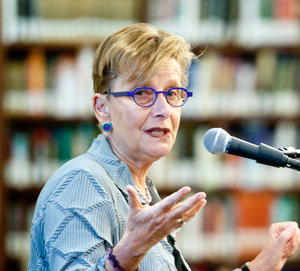
Marianne Hirsch
USC Shoah Foundation’s 2013 Yom Hashoah Scholar in Residence, Marianne Hirsch, says she is looking forward to discussing digital technologies and how to teach future generations about genocide at the Memory, Media and Technology: Exploring the Trajectories of Schindler’s List international conference this November.
Hirsch, who is the William Peterfield Trent Professor of English and comparative literature at Columbia University and professor at the Institute for Research on Women, Gender and Sexuality, is serving on the conference’s steering committee. She will also speak on the “Place and Media in Remembering Genocide” panel. The conference is the first to be co-sponsored by USC Shoah Foundation and its Center for Advanced Genocide Research and will be held Nov. 16-18.
As Yom Hashoah Scholar in Residence, Hirsch discussed her work on post-memory: the relationship that children of Holocaust survivors have with the personal, collective and cultural trauma of their parents. Hirsch was born in Romania, and her own parents are survivors of the Romanian Holocaust from Czernowitz.
The conference will bring together scholars of testimony and witnessing, practitioners, archivists, and museologists from around the world, offering unique opportunities for everyone to think together about the problems they all face in their own contexts, fields and disciplines, Hirsch said.
Hirsch said the conference will be both broadly comparative, addressing diverse histories of violence ranging from the Holocaust to the Cambodian Genocide, and also closely focused on the uses of digital media in the commemoration, archiving and teaching of these histories.
“This unique combination of range and focus, along with the participation of scholars and practitioners from different countries and institutions, will enable productive exchanges and, I hope, new visions of the creative pedagogical potential of digital media,” she said.
She is interested in the conference’s focus on digital technologies and their abilities to create memory for the future, but Hirsch said she hopes she and her colleagues can also keep a critical eye on the risks these technologies pose and on their limitations.
In particular, Hirsch hopes the conference will address a range of technical, pedagogical and ethical questions about how we can transmit violent pasts to future generations – “how we can do so while doing justice to particular histories and also enabling students to connect those histories, without collapsing them,” she said. “And how we can enable young people to maintain some optimism and hope in the face of devastating violence.”